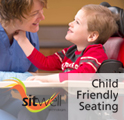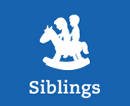I’m an adult sibling to a brother with disabilities. I’m a sib. I love this label. Today, I embrace this label happily. It’s shaped who I was, who I am and where I’m going. It’s not my whole identity but it’s certainly a large part.
But I don’t sugarcoat. I’m a life coach whose mission is to help other people embrace their true, authentic selves. That being said, I want to state — from personal experience — that being a sib is hard. It was hard when I was a young child; it was hard in my teenage years; it’s hard now in my adulthood; and I’m prepared for more hardships in the future when I takeover caregiving responsibilities for my bro.
To be upfront and clear, I’m not writing this article to garner sympathy…or to be in competition for “who had it harder”…or to be yet another seemingly “privileged” white girl who’s getting on her soapbox.
No. I’m writing this article because I want to give a voice to fellow siblings of people with disabilities. Too often the “forgotten ones” in the family unit when disabilities are present, I want to give encouragement to families to rethink “inclusion” not just in context to their child(ren) with disabilities but also in context to their child(ren) without disabilities.
And it begins with understanding the term “glass child.”
Several years ago, during a continued life-long quest to seek out quality content about being a sibling to a person with disabilities, I stumbled upon a TEDx talk on YouTube called “Recognizing Glass Children.”
The speaker Alicia Meneses Maples (formerly Arenas), an adult sibling to an autistic brother, gives a raw and candid account of what it was like during her formative years to grow up in her household, experience life as a sib and navigate different hardships.
So why is a sib called a glass child?
Definition of a Glass Child
Despite what people may assume, “glass child” does not mean “fragile” or “breakable.” It’s quite the opposite actually. Glass children are children who grow up in a home with a sibling who takes up a disproportionate amount of parental energy. This can be a child with an obvious physical, cognitive or emotional disability; it can also be a child with an addiction, a serious illness, or significant behavioral issues.
The siblings of this child are called glass children because their typically overwhelmed parents look at them and rather than see their needs…. look right through them.
Labels, Smables…It Was the Clarity I Was Always Looking For.
Prior to discovering this TEDx Talk, I never knew there was a term floating out there aligned with the siblings of children with disabilities.
I frequently hear from fellow sibs that it was common to feel “invisible” growing up. Knowing that somewhere along the way, an individual or group of people had the foresight to recognize some thematics in the sibling experience and create a term to describe us, feels – at least to me – like we’re a little more recognized than we might think.
It rings true for me the notion that overwhelmed parents look at their child(ren) without disabilities and rather than see their physical and emotional needs, the parents see right through them.
From my experience as the non-disabled child in the family unit, I grew up believing that I was supposed to be “perfect.” I was supposed to behave well (always!) and bring home good grades. I was supposed to make friends easily and have very few emotional stressors. I was supposed to be involved in a lot of activities and excel in all of them. I was supposed to do everything in my power not to add extra stress onto my parents.
From my parents’ perspective, everything looked cool, calm and collected. Why would there be any reason to doubt I wasn’t doing completely fine? And hence, my parents went forth with the majority of their time and attention focused on my brother with disabilities.
What my parents didn’t see (in other words, what they failed to recognize) were examples like the following. And by the way, I’m not putting 100% blame on them. I got REALLY good (TOO good) at hiding my emotions and pretending everything was fine.
• Anxiety for years about whether or not my brother could die from a seizure while sleeping.
• Deep anger that my family would never be able to do “normal” holidays — something adventurous like skiing or camping.
• Enormous pressure to always be perfect in the eyes of her parents.
• Mind-boggling confusion by all the medical terms I heard tossed around at my brother’s doctor appointments and at home that no one seemed concerned to explain to me.
• Embarrassment that that every time we go to the park district pool, I have to give other kids dirty looks for staring at my brother with disabilities.
• Chronic anxiety about one day becoming a caregiver for my brother with disabilities (the elephant in the room that no one ever talked about!).
• Excessive worry in my teenage years that I’ll “never find love” because what if the people I date don’t “accept” my family and the future that comes with it.
• Guilt that I was born “normal” and my brother wasn’t.
And this list of examples could go on and on. These just happen to be a few of mine. Sibs keep these thoughts, and millions more like them, inside. So on the exterior to those around us, we seem fine, we look well, there’s no need to worry, all is good.
Let’s Talk Change
When Alicia gave her profoundly impactful TEDx talk more than 10 years ago, it was a call out to society. It was a call out to parents, teachers, healthcare professionals, social workers and mental health professionals to also recognize the non-disabled child(ren) growing up within the family unit.
Today, I echo Alicia’s call out to society and want to reignite conversations about the notion of “inclusion” in and out of the home.
• Siblings of children with disabilities need to feel included from an emotional connection standpoint. Mental health is key at all ages and creating a safe environment for all members of the family to express and share is incredibly important.
• Siblings of children with disabilities also need to feel included from a logistical standpoint. Historically. sibs have had few opportunities to receive information and support. Sibs are often overshadowed at home and overlooked by service providers. This is poor thinking on behalf of parents and service providers who should have the foresight to realize that it’s the sibling(s) who will one day take over caregiving responsibilities. Being included in life-long decision-making discussions and future planning needs should start early on in the sib’s life.
Glass Children turn into Glass Adults
Ok, so the term “glass adult” isn’t real. But for the millions of children who grew up with a brother or sister with disabilities who felt “looked through” instead of “looked at”… that “script” doesn’t easily go away.
In 2020, I had the great pleasure of catching up with Alicia over the phone. Just as she had so eloquently spoke her words 10 years earlier during her speech, she said, “The behaviors and belief systems that are integrated into our childhood carry with us into adulthood unless there’s some kind of intervention. In adulthood, this typically appears as addiction or a different self-sabotaging behavior as well as having general low self esteem because glass children are conditioned to think their validation is achieved in the eyes other other people.”
It’s typically not until sibs reach adulthood and work with a specialized therapist or life coach for siblings of people with disabilities that they understand the magnitude of the “glass child” impact.
Here’s What We Can Start Doing
Everyone:
Before you go any further, you must watch the TEDx talk “Recognizing Glass Children.” Click here or watch below. Alicia’s story is remarkable. Her vulnerability is inspiring. Alicia’s message is specifically directed towards society because it’s society as a whole who is mission critical for creating change in the lives of children growing up with siblings with disabilities.
Parents of Children With and Without Disabilities:
Continue to wake up every morning being the badasses that you are. Remember that life doesn’t give you anything that you cannot handle. Recognize that right now, our society is conditioned to empathize with you, the parents, as well as give individualized focus to your disabled child. But also be cognizant of your non-disabled child’s role in the family dynamic. Your non-disabled child will likely outlive you. Your non-disabled child will one day become the primary caregiver for your child with disabilities. Recognize this relationship that will play out over the course of your lives together. Be mindful of mental health issues. Spend dedicated one-on-one time with your non-disabled child. Listen to your child; validate their feelings. Explain medical terms. Don’t expect your child to take on responsibilities beyond their age level. Let your child make mistakes; don’t expect perfection.
Service Providers:
This is broadly speaking to teachers, social workers, healthcare professionals, mental health professionals and service providers working in the disability space. Include siblings in important planning conversations. Explain things. Be mindful of the sibling’s mental health status. Recognize that siblings are key members of the family unit and should be treated as such. Consider creating specialized programs for sibs that reach people at all ages.
Adults Siblings of People with Disabilities:
Take a deep breath. How are you feeling after digesting this blog post and watching the TEDx talk? If you want help navigating your emotions, healing old wounds and/or starting your self-discovery journey, I’d love to get you started. Check out my life coaching options or my SibSpace chat passes. You can also visit my store for some other cool stuff I’ve created for fellow sibs.
Like I stated in the beginning, I’m an adult sibling to a brother with disabilities. I’m a sib. I’ve come to love this label. It’s not my whole identity but it’s certainly a large part. It’s shaped who I was, who I am and where I’m going.
As my message continues to emerge in today’s “conscious living” landscape, I want to positively affect the upbringings of millions of children growing up with siblings with disabilities. And I want to adult sibs today to know that I’m here for them. You’re no longer the “forgotten ones” of the family unit. Because of
You, Sib is here for you.
Warmly Xo,
Julie






























